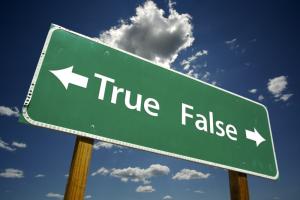Can Anything Be Religion?
Here, this time, I take off my Christian theologian’s hat and wear only my religion scholar hat. I hold three degrees in religious studies, two from a major secular research university (Rice, Houston, Texas). I have been involved in various program units of the American Academy of Religion including one that focuses on new and alternative religions especially in America. I have conducted non-sectarian research into new and alternative religions, presented scholarly papers at professional societies of religion scholars and published some of them in non-sectarian, secular volumes such as one about new religions published by SUNY (State University of New York) Press.
Here is the problem. In America today, as elsewhere, new religions are constantly popping up, claiming to be religious for tax purposes. Some countries have established panels of religion scholars to advise governments about which ones are truly religious and which ones only claim to be religious in order to gain tax exempt status.
This is what we need in the U.S.—a government-recognized panel of scholars with Ph.D.s in religious studies from accredited universities—to advise government entities and courts about new “churches” and religious groups and organizations as to whether they count as truly religious or whether they were organized primarily to gain tax advantages.
Such a panel would be put together from applicants and nominees by attorneys general of the country and states. The members would use objective criteria which they learned in their graduate studies in religion. There are such objective criteria. Too few people know that religious studies or studies of religion is a recognized scholarly discipline and that many U.S. (and other) universities offer graduate degrees in it.
One credential I would insist on for members of such a advisory panel would be a Ph.D from an accredited research university. Another one would be a reputation of being able to “bracket out” his or her own religious or non-religious commitments and be objective in describing and interpreting religions other than his or her own.
In my plan, this panel would be consulted whenever a new church or religion, one not yet granted tax except status, applies for tax except status as a religion. With today’s technologies (e.g., Zoom) the members would not have to come together physically in order to consult about the application and advise.
This process would only come into play when a church or other “religious” group or organization does not already belong to a denomination (broadly defined) or other formal network that has tax exempt status.
Why this proposal? Well, I could get into trouble for giving case studies. And that is the reason my proposal includes that the members of the panel could not be sued. Many religious organizations will sue anyone who publicly claims they are a cult or non-religious. I am well-aware of many groups including self-identified “churches” that seek tax exempt status that are, in my scholarly opinion, not religious at all. There is good evidence that they were established AS RELIGIOUS primarily for the purpose of gaining tax exempt status. In some cases they already existed and THEN claimed to be a church or a religion and there is good evidence that claim was ONLY in order to gain tax exempt status. Many countries have recognized this about some of them and denied them privileges that ordinarily come with being recognized as a religious organization.
These include what I call “invented religions.” They are numerous. The mark of such is that there is absolutely no evidence of the existence of the “religion” before one individual (or perhaps a small group) got together and created it for purposes such as money, the enrichment of the founder(s) or the “enjoyment” of the use of a drug in a communal setting. Across America “churches” are popping up that focus on members gathering to experience the “high” brought about by using a particular drug. Some “religious” groups are organizing for no other reason than to protest other religious groups.
I know that some of you will ask about the aforementioned objective critic for recognizing a group, church, temple, whatever, as legitimately religious. Well, there had better be or else, given the state of culture today, anything could be recognized as religious for tax purposes. And, that is already happening. Government leaders, decision-makers, and judges have no idea how to decide whether a group is or is not legitimately religious. But trained, educated religion scholars do.
One religion scholar who educated me about this was (through his writings) the University of Chicago religion scholar Mircea Eliade. I cite him as only one example. There are many others who have written about (for example) “patterns in religions.” Virtually all students of religious studies will have either studied or been indirectly taught Eliade’s ideas about what constitutes “religion.”
I don’t expect my proposal to be implemented and that because we are in a cultural situation, in the West generally, where anything goes. How could the founding fathers of America ever anticipated a court requiring a state to allow an occult group to put up an image of an occult being (almost universally believed to be the embodiment of evil) in the capitol building? Especially when leading members of the group have publicly (here, for example) stated they do not even believe in that being? Simply put, this situation of “new and alternative religions” gaining government recognition and privileges has gotten out of hand with any and every group claiming to be a religion or religious gaining government recognition as such. They can always find some judge who will throw up his or her hands and say “Who can say what counts as ‘religion’?” Well, we can. Those of us who spent years gaining terminal degrees in religious studies in major American (and other) universities!
*Note: If you choose to comment, make sure your comment is relatively brief (no more than 100 words), on topic, addressed to me, civil and respectful (not hostile or argumentative), and devoid of pictures or links.*














